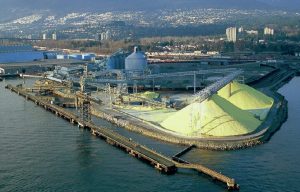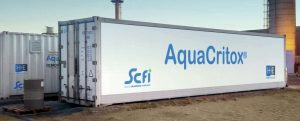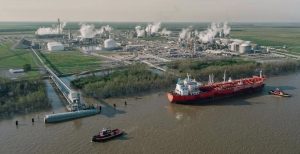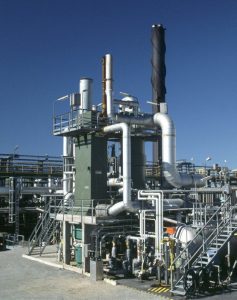
Canadian sulphur
After many years of slow decline, Canadian sulphur exports have begun to rise slightly, but dwindling US markets are seeing a move towards more sulphur forming to expand export opportunities.

After many years of slow decline, Canadian sulphur exports have begun to rise slightly, but dwindling US markets are seeing a move towards more sulphur forming to expand export opportunities.

Construction work has begun on a new hydrocracking complex for the Assiut refinery in Egypt, in the central Nile valley, according to TechnipFMC plc, who won the $1 billion engineering, procurement, and construction (EPC) contract for the project. The contract involves construction of new processing units including a vacuum distillation unit, a diesel hydrocracking unit, a delayed coker unit, a distillate hydrotreating unit and a hydrogen production unit which will use TechnipFMC’s proprietary steam reforming technology.
Brimstone STS Ltd. today announced a new partnership with Sulphur Recovery Engineering Inc (SRE). The two companies say that this collaboration will bring together decades of experience and the latest technology in support of the sulphur recovery and gas treating industry worldwide.
In early October Tesla held a ‘battery day’ event at its headquarters in Fremont, California. Speaking at the event, company founder and CEO Elon Musk outlined his vision for the electric car industry over the coming decades, and spoke particularly to his ambitions for the nickel industry. He had already called for more mining of nickel earlier in the year, and has said that Tesla is developing cathodes that will contain higher nickel and no cobalt. The latter comes after a lawsuit against Tesla and several other high-tech US firms for allegedly supporting human rights violations by buying cobalt from the Democratic Republic of Congo. Musk echoed the potential ‘reputational risk’ for the nickel market and called for more sustainable nickel production, dangling the prospect of a “giant contract” with any miners that could produce nickel in an “environmentally sensitive way.” Tesla is reportedly in discussions with Vale and BHP as well as the Indonesian government concerning potential investments in nickel production.
Illinois-headquartered CF Industries has made a long-term commitment to low-carbon ammonia production and net-zero emissions.

Johnson Matthey and KBR have announced that they have signed a global strategic alliance agreement to license a new ammonia-methanol co-production process that combines the companies’ ammonia and methanol process technologies. The companies say that the co-production process makes the most of synergies between the two technologies, maximising savings while offering the highest levels of safety, flexibility and reliability.

The US Environmental Protection Agency (EPA) and the US Department of Agriculture (USDA) have announced the ‘Next Gen Fertilizer Challenge’, a joint EPA-USDA partnership and competition to advance agricultural sustainability in the United States. The competition includes two challenges that seek proposals for new and existing fertilizer technologies to maintain or improve crop yields while reducing the impacts of fertilizers on the environment.
Recent protests in Belarus have triggered a wave of share price volatility, London’s Financial Times reported on 18th August.

Haldor Topsoe and Comprimo® have announced a global strategic alliance to jointly license the TopClaus sulphur removal and recovery technology. TopClaus combines Topsoe’s energy efficient wet sulphuric acid (WSA) process with the industry-standard Claus process, enabling plant operators to handle acid gases and achieve sulphur removal efficiencies of above 99.9%. The Claus part of the unit recovers elemental sulphur from acid gases, and the tail gases from the Claus unit are then treated in the WSA unit, where the remaining sulphur compounds are converted into sulphuric acid.
Johnson Matthey (JM) has been selected by China’s Ningxia Baofeng Energy Group as licensor for a third methanol synthesis plant at their coal to olefins complex near Yinchuan in Ningxia province. With a planned capacity of 7,200 t/d (2.4 million t/a), the unit will be the largest single train methanol plant in the world once completed.